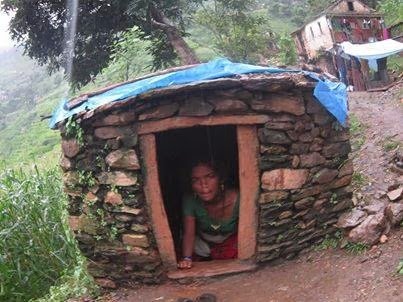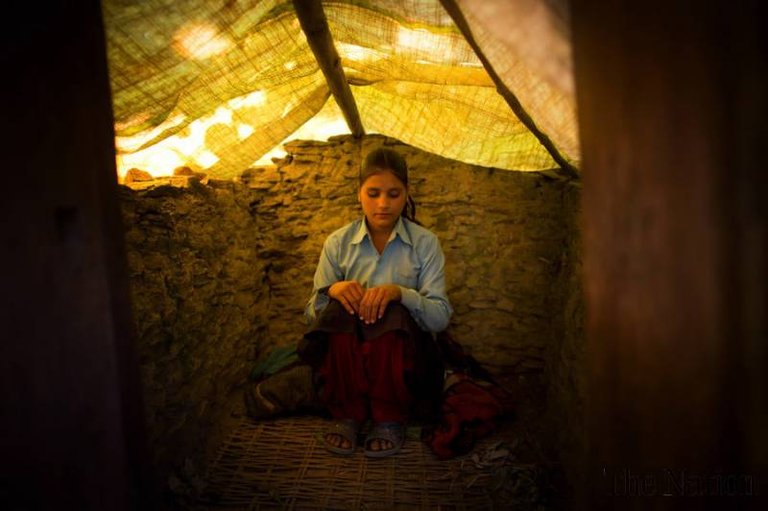Menstruation has been a curse to Nepali women for centuries. Many communities in Nepal consider menstruating women as impure and they are forced to live in small and crude huts called chhau goth, away from homes during their periods .

A menstruating woman in her chhau goth Photo source : bageshworipost
Nepal’s parliament only today (August 9) criminalised the isolation of menstruating women, a traditional malpractice that banishes women from their homes during menstruation, even though it was banned around 10 years ago by the Supreme Court.
The new law stipulates a three-month jail sentence or a 3,000 rupee fine ($30), or both, for anyone forcing a woman to follow the custom. “A woman during her menstruation or post-natal state should not be kept in chhaupadi or treated with any kind of similar discrimination or untouchable and inhuman behaviour,” reads the law, passed in an unanimous vote.
The menstruating women are banished from their homes and they are not allowed to touch edibles, water, men and even cattle. They have to live in total isolation in those small huts for 4/5 days. Teenage girls menstruating for the first time are kept in those huts for 13 excruciating days. While women in their periods are given utmost care in respect in the West, the Nepali women have to live a depressing life in the huts with no one to talk to and take care of their basic needs. Besides, being mentally troubled for their natural processes, the women also face various risks.
Only last month, a teenage girl died from snakebite while sleeping in a chhau goth. Two other women died in late 2016 in separate incidents while also following the ritual — one of smoke inhalation after she lit a fire for warmth, while the other death was unexplained. Rights activists say many other deaths likely go unreported. (data source : AFP)
Apart from deaths and mental harassment, there have been many instances where women living in these huts have been sexually assaulted by men. Most of these cases go unreported as the rape victims are shunned and shamed by the society. The law is likely to come in effect only in a year. But I think merely passing the law will not help much. In the backward societies, even the law enforcers side these traditional malpractices instead of helping the women. I think proper education in the grassroot level is only the solution of this problem. Its high time INGOS working for women's rights and donor agencies start taking this problem seriously.
Photo : Nation
Congratulations @tagsplanet! You have completed some achievement on Steemit and have been rewarded with new badge(s) :
Click on any badge to view your own Board of Honor on SteemitBoard.
For more information about SteemitBoard, click here
If you no longer want to receive notifications, reply to this comment with the word
STOPUnfortunately people in some places, still living dark ages. I hope many people read and learn this post.
Thank you. It would be really helpful if you could resteem this.
Sure, i do.
Ugh, because nothing celebrates life like time in an isolation chamber. This is a classic example of why not all cultural traditions are worth venerating.
Agreed 100%. This is how the battle against ignorance is won. Awesome (although incredibly infuriating!) post!
Thank you @generikat. I'm actually working on it. Trying to educate people around me. Trying to make lives of my mothers and sisters more comfortable. Menstruation is a taboo in most middle and upper middle class families of Nepal too. I think education begins from home, so maybe we Nepali men should start making this 'burden' light on women so that everyone learns and catches up.
Actually, the culture didn't meant to do this to females. During their periods, women needs rest which they doesn't get due to their usual household works. So by saying that the girl is impure, they don't have to work and gets plenty of time to rest. That was the idea behind the cultural tradition. Its the people who understood it in a wrong way are making the women's life worse.
Makes sense. This has been the problem with most of the cultures and religions. Misinterpretation.